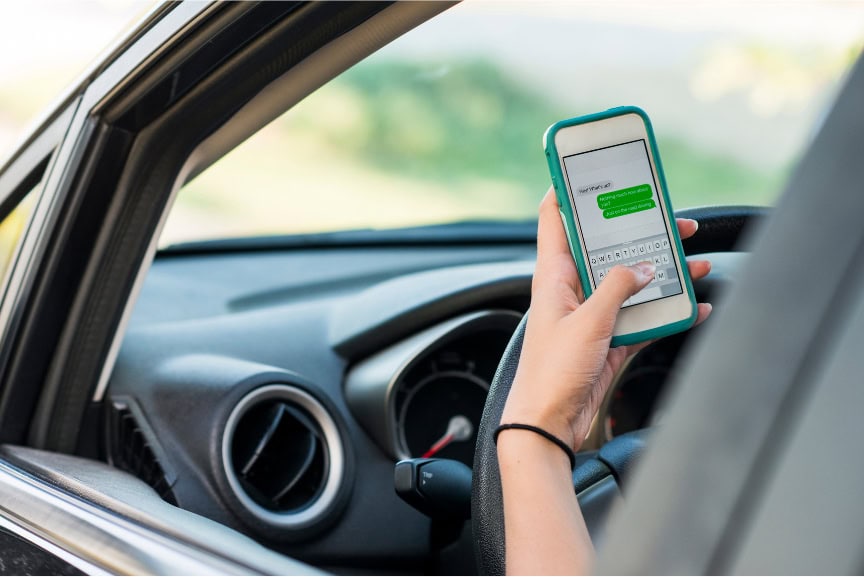What is Distracted Driving?
Almost one-third of drivers in the United States aged 18 to 64 read or send texts or emails while driving. Research shows that distraction-related crashes killed 3,142 people in 2020, accounting for 8.1% of road deaths.
Distracted driving occurs when your attention as a driver shifts to a secondary task that requires focusing on something unrelated to the driving task. It is a myth that all humans can multitask, and in contrast, most people switch between tasks. Further, the human cognitive ability does not allow us to perform one conscious task simultaneously.

All distractions impair your ability and endanger the driver’s, other drivers’, passengers’, and pedestrians’ safety. Distractions can be visual, manual, or cognitive.
Distracted Driving and the “Pure” Contributory Negligence Rule in North Carolina
North Carolina follows a unique system and is one of only five states that applies a “pure” contributory negligence rule. If a plaintiff’s negligence contributed to the accident even 1%, they cannot recover damages from the defendant–also called the “all or nothing” rule. Other eastern states, such as Virginia, Alabama, Maryland, and Washington, D.C., have the rule.
Unless in an emergency or when communicating with a parent or spouse, drivers under 18 may not use mobile phones or technology related to mobile phones while driving. If the violation occurs, the violator must pay a $25 fine, but no points will appear on their driving record or insurance rating.
It violates the law for drivers to read or write texts or emails while driving, and offenders get a $100 fine with additional court costs.
An experienced North Carolina personal lawyer can assist you in finding evidence that provides a defense to contributory negligence after you are injured. Because a defendant is likely to claim that you caused the accident if the injuries are severe and expensive. Their goal is to prevent you from pursuing compensation even if you play a minor role.
How Can You Reduce Driving Distractions?
To reduce distractions while driving, here is what you can do:
- Consider using an app.
- If you’re the passenger with a distracted driver, speak up.
- Request that the driver concentrates solely on driving.
- Assist the driver with navigation or other tasks to reduce distractions.
What can parents do?
- Discuss the rules and responsibilities of driving with your teen or young adult.
- Explain the risks of distracted driving to your teenagers and familiarize yourselves with the penalties for talking or texting while driving in your state.
- Set penalties for driving while distracted in your household.
- Visit the National Highway Traffic Safety Administration’s website for more information on teen driving safety.
When You Need a North Carolina Personal Injury Lawyer
While law enforcement is essential in reducing distracted driving crashes, injuries, and fatalities, state laws must apply. In 2021, the GHSA and the Transportation Research Board’s Behavioral Traffic Safety Cooperative Research Program (BTSCRP) released a research report that examined distracted driving laws, enforcement, and public education practices across the United States.
“Pure” contributory negligence can cause stumbling blocks in personal injury cases. But an experienced attorney may help you get the compensation you deserve. The ” last clear chance doctrine” is among the defenses against contributory negligence
The plaintiff can still recover, even though he was in a position of peril because of the defendant’s negligence. If the defendant could have avoided injuring the plaintiff (by braking) but does not, the plaintiff may still recover.
Protect Yourself and Get the Rightful Compensation
In North Carolina, several different negligence laws may apply to your injuries. But you can count on Harman Law if you have a personal injury case. Our attorneys know North Carolina’s rules on contributory negligence and tortfeasor contribution. Contact Harman Law today.
